The Harvard Family Research Project separated from the Harvard Graduate School of Education to become the Global Family Research Project as of January 1, 2017. It is no longer affiliated with Harvard University.
HFRP’s policy briefs and research papers draw attention to the vital contribution of family engagement to children’s healthy development and school success. They offer new frameworks for family engagement, promote dialogue in the field, and inform the development of policy.
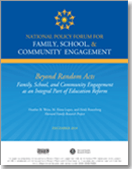 |
Beyond Random Acts: Family, School, and Community Engagement as an Integral Part of Education Reform Heather B. Weiss, M. Elena Lopez, and Heidi Rosenberg This paper, authored by Harvard Family Research Project, served as the foundation for panelists’ discussions at the National Policy Forum for Family, School, and Community Engagement. Beyond Random Acts provides a research-based framing of family engagement; examines the policy levers that can drive change in promoting systemic family, school, and community engagement; and focuses on data systems as a powerful tool to engage families for twenty-first century student learning. |
| The Head Start Parent, Family, and Community Engagement Framework: Promoting Family Engagement and School Readiness From Prenatal to Age 8 National Center on Parent, Family, and Community Engagement This Office of Head Start Parent, Family, and Community Engagement (PFCE) Framework is a research-based approach to program change. It illustrates how Head Start/Early Head Start programs can work together as a whole—across systems and service areas—to promote family engagement and children’s learning and development. The Framework was developed by the Office of Head Start with the assistance of the National Center on Parent, Family, and Community Engagement, a partnership between the Brazelton Touchpoints Center and Harvard Family Research Project. Download PDF |
|
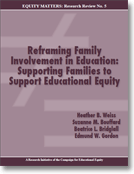 |
Reframing Family Involvement in Education: Supporting Families to Support Educational Equity |
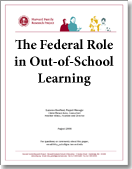 |
Heather B. Weiss, Priscilla M. D. Little, Suzanne M. Bouffard, Sarah N. Deschenes, Helen Janc Malone What, in conjunction with good schools, is necessary to increase the chances that all children, especially disadvantaged ones, will enter and leave school with the skills they need for 21st-century success? Four decades of research demonstrate it is necessary to redefine learning—both where and when it takes place—if the country is to achieve its national goal of educating all children. Commissioned by the Center on Education Policy, this report from HFRP makes a research-based case for federal provision of out-of-school complementary learning supports from birth through high school, particularly for poor children, so that all students gain the skills that economists, educators, and employers agree are necessary for success in the 21st century. |
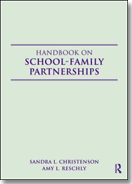 |
From Periphery to Center: A New Vision for Family, School, and Community Partnerships Heather B. Weiss, Naomi Stephen This chapter—which will appear in the Handbook of School–Family Partnerships—presents a comprehensive, integrated family, school, and community partnership framework that can help level the playing field for disadvantaged children and ensure that they have access to the parental involvement and community engagement practices of their more advantaged peers in order to enhance their learning. Download PDF |
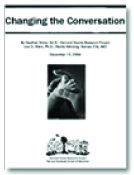 |
Changing the Conversation About Home Visiting: Scaling Up With Quality Heather B. Weiss, Lisa G. Klein Home Visition Hearing: Heather B. Weiss Heather B. Weiss testifies at an Education and Labor Committee hearing concerning H.R. 2343, the Education Begins at Home Act, on June 11, 2008. |
|
Principles | State Policy | Partnerships | Additional publications to help inform family engagement policy |
|


